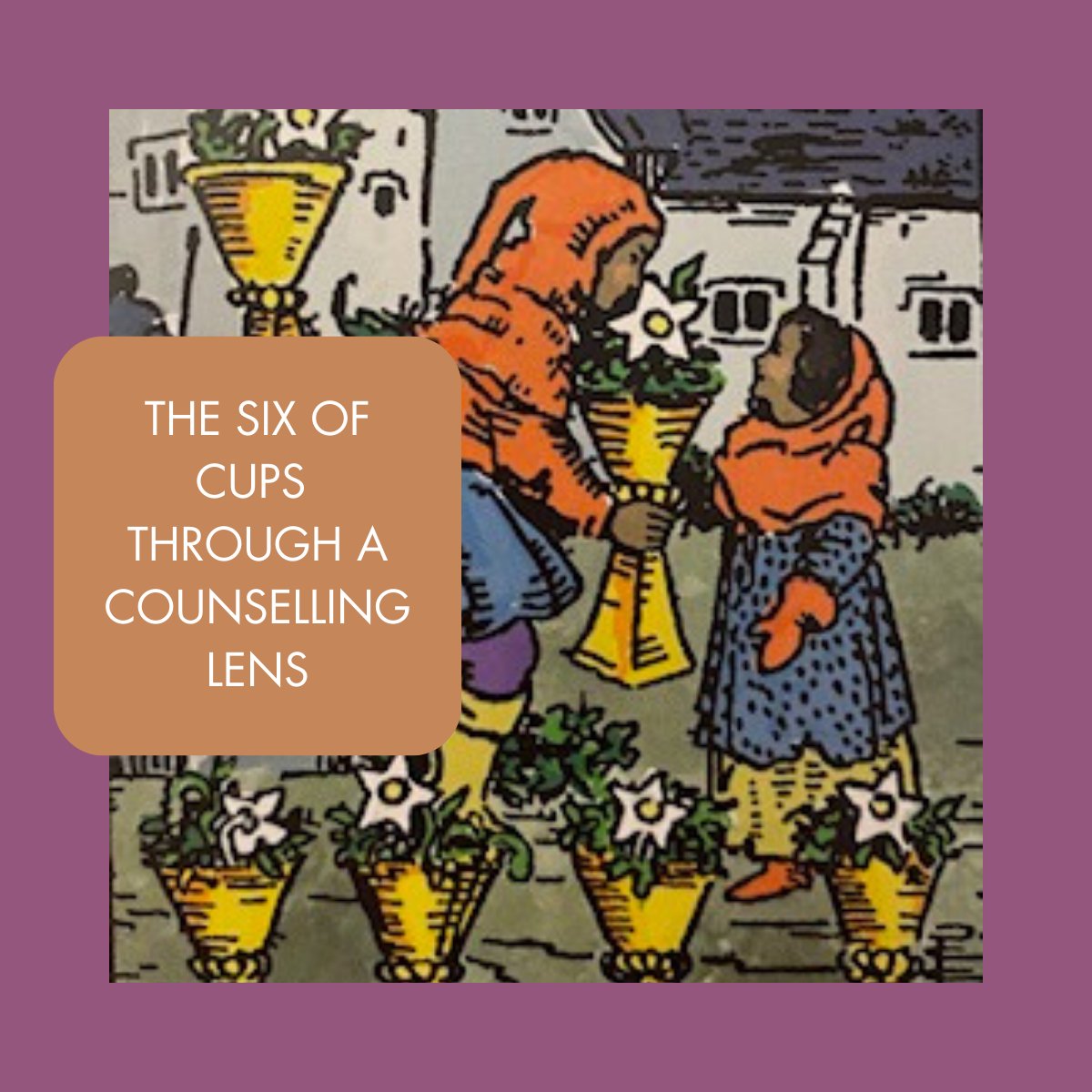The Six of Cups Through A Counselling Lens: Find Inner Peace Through Your Safe Havens

Registered Clinical Counsellor in Qualicum Beach
The Six of Cups is a wonderful Tarot Card. Let’s take a moment to explore it through a counselling lens. The card image depicts either an older child, or a Little Person (there are different interpretations of the card out there!), bending down to offer a cup containing a lily to a young, small child. The younger child looks up to the older figure with love and admiration. Her arms are open, appearing receptive and grateful for the offering. Their eyes gaze kindly to one another. There is a sense of warmth, kindness, and comfort between them. The two figures stand in a courtyard before a large home in the background, while the foreground has more cups filled with lily flowers.
This card is often interpreted as nostalgia and happy past memories. However, a number of Tarot interpreters offer further insight into this card, which strongly relates to several counselling theories, including Emotionally Focused Therapy and Polyvagal Theory. Author, Rachel Pollack, notes this card reminds us that benevolent, sweet memories from the past can create a sense of security and comfort. It marks a time when a secure attachment figure created a sense of safety, belonging, and security in our lives. We can draw upon the emotions of these past experiences to help us navigate through our current problems. Zen Buddhist minister, Lisa Freinkel Tishman, says that these types of memories from our past can be a source of healing, and of inspiration. These kinds of memories can be like a mirror to look upon so that we can remember our truer self. The Six of Cups reminds us that we can draw strength from, and calm a stressed nervous system, when we remember our important relationships with the people who made us feel seen, heard and valued, and the experiences that shaped, soothed comforted us.
Both Emotionally Focused Therapy and Polyvagal Theory draw upon “Safe Haven” memories and images of people, places, pets, and spiritual or mystical figures that help us to re-connect with peace and to calm our nervous system when we are in a state of fight or flight, such as anxiety, stress, anger, and overwhelm. Not only does brining “Safe Havens” back to mind regulate our nervous system and emotions, but re-connecting with them can help us to remember their messages to us to build our sense of worthiness, value, and belonging. Jungian analyst and author James Hollis, write that we have to re-connect with the safe havens that gave us a sense of worth, inherent value, love, approval, and validation. We can then draw upon these resources to navigate difficult life transitions, to break unhelpful emotional reactivity, to lessen the harsh voice of the inner critic, and to build more self-acceptance, self-worth, and self-trust.
What might your safe havens be? Is there a person, either from your current life or your past, who is/was engaged and accessible when you needed comfort and support? Was there a pet in your life who you could give love to and receive love from? If that pet could talk, what kind and compassionate words would they say to you? If there a place, real or imagined, that makes you feel at peace, rejuvenated, and secure?
Occasionally, when we turn towards our safe havens, our inner critic can show up. That’s normal. Our inner critic, although very harsh in its tactics, is always working to protect us. It might be that the inner critic needs to also feel seen and acknowledged for its hard work in protecting us. It could be that the inner critic also needs a safe haven space to find peace.
There are often nuances to the techniques and practices we use to create personal growth and inner transformation. We cannot always do it on our own. I am a Registered Nurse and Registered Clinical Counsellor in Qualicum Beach. If you are interested in working with me, book a free 15-minute inquiry call with me by clicking HERE
Sources:
Hollis, J. (2023). A life of meaning: Relocating your centre of spiritual gravity. Sounds True.
Johnson, S.M. & Campbell, T.L. (2022). A primer for Emotionally Focused Individual Therapy (EFIT): Cultivating fitness and growth in every client. Routledge.
Pollack, R. (1997). Seventy-eight degrees of wisdom: A book of tarot. Thorsons.
Tishman, L.F. (2021). Mindful tarot: Bring peace a peace-filled, compassionate practice to the 78 cards. Llewellyn Publications.

